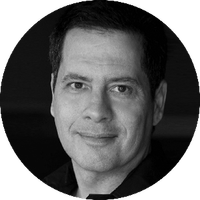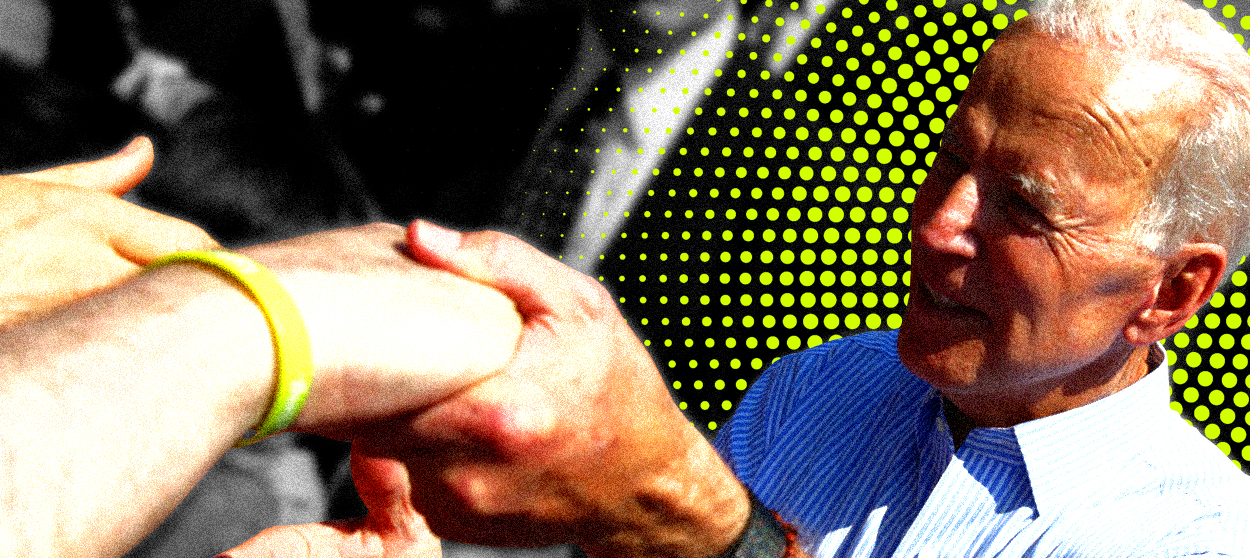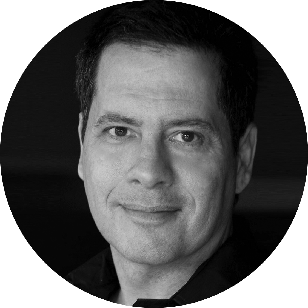The insidious message behind Joe Biden's call for 'unity'
He's insulting progressive voters with a dangerous false equivalence


A free daily email with the biggest news stories of the day – and the best features from TheWeek.com
You are now subscribed
Your newsletter sign-up was successful
If you live long enough to witness more than a few seasons of American politics you learn one thing for certain: Unity is a sucker's game. Unity is what they sell you when they're all out of justice. Unity is the little Fourth of July flag they hand you so you won't ball a fist.
That's the kind of unity Joe Biden pitched, high and tight — a threat as much as an offering — to a crowd of about 6,000 presumed supporters in the City of Brotherly Love on Saturday afternoon. Flanked by red, white, and blue signs that made the insistent rather than inspirational nature of his theme crystal clear by rendering it in the past tense (UNITED), Biden, as he has done throughout the early weeks of his campaign, made Trump his target, referring to him several times as the "divider-in-chief." He also, rather pointedly, promised that "You will not hear me speak ill of another Democrat."
The remarks by the relentlessly avuncular Biden had three main purposes: to double down on the argument that Trump is an aberration, the product of an uncharacteristic moment of undemocratic madness on the part of Biden's otherwise sane and patriotic "friends across the aisle;" to present himself as the candidate of restoration, the embodiment of the Good Old Days; and to make the case that the only way to beat Trump was with a "unity" that would brook no dissent, or even reasonable vetting.
The Week
Escape your echo chamber. Get the facts behind the news, plus analysis from multiple perspectives.

Sign up for The Week's Free Newsletters
From our morning news briefing to a weekly Good News Newsletter, get the best of The Week delivered directly to your inbox.
From our morning news briefing to a weekly Good News Newsletter, get the best of The Week delivered directly to your inbox.
The unmistakable message to Democratic voters was clear: FALL IN LINE.
A perhaps unintended corollary to Biden's message was also present in his remarks, and, as chilling as it was, it's difficult to see how he will be able to avoid expressing it again going forward. Biden repeatedly insisted that the anger Democratic voters feel is not only the enemy of all-important party unity but essentially the same as the anger felt by Trump supporters:
"Some of the really smart folks say Democrats don't want to hear about unity," Biden said. "They say Democrats are so angry, and that the angrier your campaign will be, the better chance you have to win ... Well, I don’t believe it. If the American people want a president to add to our division, to lead with a clenched fist, closed hand, a hard heart, to demonize the opponents and spew hatred — they don’t need me, they've got President Donald Trump."
Six months after a righteous rage-fueled blue wave swamped Republicans from coast-to-coast, and mere days after the anger of women everywhere spiked to DEFCON infinity over the barbarism let loose in Alabama, Ohio, Missouri, and Georgia, Biden was reducing the response of millions of Americans to the flagrant cruelty and systemic oppression inflicted upon them to mere "division." In his telling, the reactionary fury of people who want to put babies in cages, pregnant women in back alleys and people of color in their place is no different from the passion aroused in the folks whose lives they are destroying.
A free daily email with the biggest news stories of the day – and the best features from TheWeek.com
That kind of insidious false equivalence has been present in lots of historical calls for impunity — I'm sorry, unity — and it always serves the same masters.
An open letter titled "A Call for Unity" was issued by a group of eight moderate white clergymen in Birmingham, Alabama, on April 12, 1963, as a response to peaceful protests the previous day, led by Martin Luther King, Jr., who had been arrested along with 49 others. The clergymen called King's protests "unwise and untimely … extreme measures," that would "incite to hatred and violence, however technically peaceful those actions may be."
The next day, King answered "A Call for Unity" with his famous "Letter from Birmingham Jail," in which he wrote: "My citing the creation of tension as part of the work of the nonviolent resister may sound rather shocking. But I must confess that I am not afraid of the word 'tension.' I have earnestly opposed violent tension, but there is a type of constructive, nonviolent tension which is necessary for growth."
King understood that the only unity worth fighting for was one cemented with justice, and that the unity he was being asked to put his faith in was in actuality the opposite of brotherhood or devotion to common ideals. It was an insistence on not rocking the boat, on the powerless continuing to suffer in silence while the powerful reaped the benefits of their acquiescence. It was a cudgel in the shape of an olive branch.
Just six months after the Alabama clergymen's call for unity, on September 15, 1963, four young girls were killed when a bomb set by members of the Ku Klux Klan exploded at 16th Street Baptist Church in Birmingham. It was precisely the kind of cataclysm King had implicitly warned about in his letter, and, while it's impossible to speculate, it is one that we can at least imagine being less likely if those eight clergymen had made a call for solidarity rather than restraint, for a sense of common purpose with those who were clearly fighting for an authentic, if difficult to realize, unity, one that we are as far from achieving today as we were in 1963.
The choices facing the Democratic Party in 2019 and 2020 are not far removed from the choices facing those Birmingham clergymen in 1963. Democrats can choose to listen to the voices of those for whom the notion of unity has long been an empty promise, or they can buy what Uncle Joe is selling: The belief that lockstep devotion to the status quo is somehow a means of getting to a vaguely defined better world, that unity is how we will get justice, rather than the other way around.
Peter Birkenhead is a writer who lives in Washington, D.C. His work has appeared in The Washington Post, The Daily Beast, the Los Angeles Review of Books, and other publications. He is the author of Gonville, a memoir published by Simon & Schuster.
-
 Political cartoons for February 16
Political cartoons for February 16Cartoons Monday’s political cartoons include President's Day, a valentine from the Epstein files, and more
-
 Regent Hong Kong: a tranquil haven with a prime waterfront spot
Regent Hong Kong: a tranquil haven with a prime waterfront spotThe Week Recommends The trendy hotel recently underwent an extensive two-year revamp
-
 The problem with diagnosing profound autism
The problem with diagnosing profound autismThe Explainer Experts are reconsidering the idea of autism as a spectrum, which could impact diagnoses and policy making for the condition
-
 The ‘mad king’: has Trump finally lost it?
The ‘mad king’: has Trump finally lost it?Talking Point Rambling speeches, wind turbine obsession, and an ‘unhinged’ letter to Norway’s prime minister have caused concern whether the rest of his term is ‘sustainable’
-
 The billionaires’ wealth tax: a catastrophe for California?
The billionaires’ wealth tax: a catastrophe for California?Talking Point Peter Thiel and Larry Page preparing to change state residency
-
 Bari Weiss’ ‘60 Minutes’ scandal is about more than one report
Bari Weiss’ ‘60 Minutes’ scandal is about more than one reportIN THE SPOTLIGHT By blocking an approved segment on a controversial prison holding US deportees in El Salvador, the editor-in-chief of CBS News has become the main story
-
 Memo signals Trump review of 233k refugees
Memo signals Trump review of 233k refugeesSpeed Read The memo also ordered all green card applications for the refugees to be halted
-
 Has Zohran Mamdani shown the Democrats how to win again?
Has Zohran Mamdani shown the Democrats how to win again?Today’s Big Question New York City mayoral election touted as victory for left-wing populists but moderate centrist wins elsewhere present more complex path for Democratic Party
-
 Millions turn out for anti-Trump ‘No Kings’ rallies
Millions turn out for anti-Trump ‘No Kings’ ralliesSpeed Read An estimated 7 million people participated, 2 million more than at the first ‘No Kings’ protest in June
-
 Democrats: Harris and Biden’s blame game
Democrats: Harris and Biden’s blame gameFeature Kamala Harris’ new memoir reveals frustrations over Biden’s reelection bid and her time as vice president
-
 ‘We must empower young athletes with the knowledge to stay safe’
‘We must empower young athletes with the knowledge to stay safe’Instant Opinion Opinion, comment and editorials of the day
